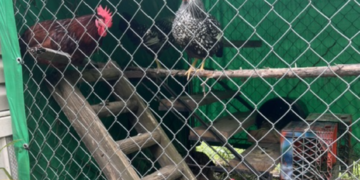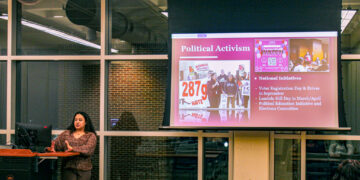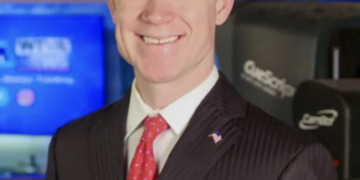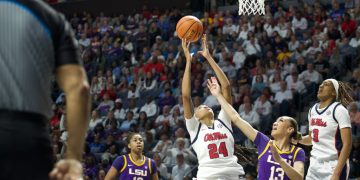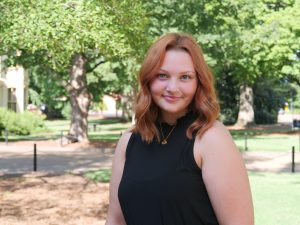
Engineering is one of the most male-dominated professions in the U.S. — with women composing only 24% of students within the University of Mississippi School of Engineering and 13% of the workforce across the country. However, at UM, Cheyenne Ethridge and her female peers within the engineering community are striving to challenge the status quo.
As a junior civil engineering major with an environmental emphasis, Ethridge has taken the helm in supporting the engineering student body, serving as the American Society of Civil Engineers Secretary, a statics teaching assistant and a Center of Graphene Research and an Innovation research assistant.
“I forget that I am in a male dominated field until I look around the room and count students,” Ethridge said. “I feel just as included and valued as any other student. It’s one of the many benefits of being in a small department where you practically know everyone and must work with them at one point or another.”
Ethridge also holds the title of concrete captain in the annual ASCE Concrete Canoe Competition, a collaboration of programs across the country that provides college students with the opportunity to measure, mix and mold concrete to form a canoe and collectively row the watercraft across a lake in a carefully calculated, high-speed race.
By becoming invested in her field of study and surrounding herself with ambitious peers and supportive faculty, she has been inspired to bloom into a thriving student. The Mountain Home, Ark. native did not always have engineering in mind when considering potential career paths.
“Ironically, I had told everyone in high school that I wouldn’t be a doctor, a lawyer or an engineer,” Ethridge said. “But when it came down to finding something I was passionate about, and could truly envision myself doing everyday for the rest of my life, I could only think of engineering.”
After taking Advanced Placement environmental science in high school, a class taught by her father, she was guided to explore professions where she could promote protection and innovation of the environment through the study and practice of engineering.
“I knew that I wanted an environmental component to any career I pursued, and I love the challenge of solving problems and finding solutions that make an impact on others,” Ethridge said. “At the end of the day, there really was no other choice for me. I wanted to be an engineer.”
With the support of the Ole Miss First Scholarship — a program that provides students with mentorship, leadership development and financial support — in addition to the Sally McDonnell Barksdale Honors College, Ethridge was able to navigate the rigorous curriculum that engineering presents and impart her knowledge onto budding STEM students as a tutor and teaching assistant.
“Working as a teaching assistant has also been extremely rewarding,” Ethridge said. “Tutoring students and teaching a recitation session allows me to interact better with the class and see the aha moments when things click for them.”
Under the mentorship of graduate students throughout her undergraduate career, Ethridge has played an active role in researching the modification of various materials with graphene, such as slow sand filtration systems, concrete and plastics.
This past summer, she embarked on her own research project that she hopes to use as her capstone project for the honors college.
“I continued helping a graduate student with filtration systems my sophomore year and began conducting research for my own project this past summer,” Ethridge said. “I will most likely work on modifying biochar for filtration systems to enhance per- and polyfluoroalkyl substances removal, which will be used as my thesis for the honors college.”
After graduating from UM, Ethridge aspires to continue her passion for hydraulic engineering by pursuing a career in water resource management or wastewater treatment at a consulting company.
As Ethridge builds toward her honors capstone and an environmentally conscious career, she reflects on the network of support she has received throughout her undergraduate experience.
“Community, to me, is an entire class congregating to compare notes, ask questions, make jokes and genuinely help one another. It’s all of my professors knowing my name and waving to me in the hallways,” Ethridge said. “I have my small little engineering family on whom I can always rely inside and out of the classroom.”




